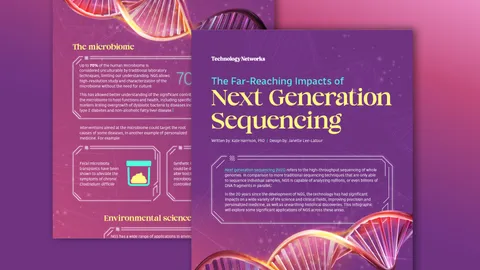The Familial Ethics of Direct-to-Consumer Genetic Testing
Consideration for the familial impact of direct-to-consumer genetic testing has been "left behind", says Dr. Jennifer Man.

The direct-to-consumer (DTC) genetic testing market has experienced unprecedented growth, with global projections reaching $9.20 billion by 2033. However, in the UK, the associated ethical frameworks have not kept up at the same speed.
A critical blind spot exists in current DTC genetic testing practices: the familial implications of genetic information and the absence of comprehensive genetic counseling support. Drawing from personal reflection as a biomedical scientist contemplating DTC testing, I believe the traditional biomedical model of individual informed consent is inadequate when applied to genetic information, because the knowledge affects biological relatives who have not consented.
From curiosity to concern and a call for genetic counseling
The DTC genetic testing market has experienced rapid growth. However, consideration for familial impact has been left behind. The current DTC genetic testing paradigm misconceptualizes consent as relating only to the individual, failing to recognize that genetic information is familial and that robust genetic counseling must be integral to ethical genetic testing.
My own contemplation of DTC genetic testing began innocuously; what I initially considered a bit of fun quickly transformed into something far more serious as I grappled with the potential implications. For example – if I tested positive for a pathogenic variant, the implications would ripple through my family network. Both my sisters would have a 50% probability of carrying the same mutation. As a mother, I faced the prospect of burdening my daughter with knowledge about her genetic risks from an early age. These family members had not consented to learn about their genetic status, yet my test results would inevitably affect them.
Herein lies a fundamental flaw in current consent processes for DTC genetic testing. The traditional biomedical model of informed consent assumes autonomous individuals making decisions about their own bodies and health. However, genetic information challenges this paradigm because it can contain information about biologically related family members who have not consented to disclosure.
Research demonstrates that family members often struggle with the burden of genetic information they did not seek and concerning patterns of family discord, anxiety and relationship strain following genetic testing disclosure. Yet current DTC testing models provide minimal support for navigating these complex family dynamics.
The familial nature of genetic information creates consequences that affect parties who were not part of the original transaction.
Just as environmental regulations recognize that individual actions can have community-wide impacts, genetic testing regulation must acknowledge that individual genetic testing decisions have family-wide implications.
Current consent processes for DTC genetic testing are inadequate for addressing these familial implications. Standard consent forms focus on individual privacy, data security and personal health outcomes, with minimal attention to family impact. The consent process typically asks whether individuals want to receive results for serious hereditary conditions, but fails to explore whether they have considered the implications for family members or developed plans for family communication.
True informed consent for genetic testing should include explicit discussion of:
- The probabilistic implications for biological relatives arising from results
- Strategies for family communication about results
- Available resources for genetic counseling and family support
- The impact of “knowing”.
The burden of family communication is also on the individual, without support or guidance as to what to do or say or how to support someone who may be receiving worrying news. This is particularly problematic for complex genetic conditions where interpreting the risk, management options and any future family planning concerns requires specialist input.
The British Society for Genetic Medicine specifically advises consumers to "think carefully before buying genetic tests, especially tests that claim to provide information about health", and invites people to think about the family impact. Yet, arguably, this organization and others like it are outside the commercial interaction between the consumer and the DTC provider. Their warnings may not reach the individual.
Research indicates that DTC genetic testing consumers frequently seek support from online forums and peer groups rather than from qualified professionals . While empowering, this can lead to misunderstanding, inappropriate anxiety or false reassurance. While a good platform to discuss potential dynamics arising from genetic information gained through DTC testing, without expert input, it can act as an echo chamber rather than reveal evidence-based approaches to genetic counseling.
The genetic counseling profession has developed sophisticated frameworks for helping families navigate genetic information, including strategies for family communication, risk assessment and decision-making support. While those accessing genetic testing through healthcare systems receive comprehensive support, the resources are largely unavailable for DTC testing consumers.
I believe the ethical responsibility to provide genetic counseling lies with the DTC provider; however, the UK does not legally mandate DTC genetic testing companies to provide this, despite repeated parliamentary recommendations since 2021. In contrast, France and Germany insist on genetic counseling within DTC products and mandate physician-led oversight for all health-related genetic tests. Portugal and Slovenia legally mandate pre-test counseling for all DTC health-related genetic tests.
In the UK, the NHS has neither the capacity nor the confidence in DTC results to pick up the people who are concerned following their tests. The Royal College of General Practitioners advises clinicians to use caution because of the high chance of false positives or false negatives.
The rapid growth of the DTC genetic testing demands an urgent response to ethical considerations. Companies that position themselves as health services have obligations to provide appropriate counseling support and family-oriented consent processes.
I believe addressing the familial ethics of DTC genetic testing requires systemic reform across four key domains:
- Enhanced consent: DTC genetic testing companies should explicitly address familial implications and require a broader consent
- Access to genetic counseling: Companies offering health-related genetic testing should provide all consumers access to qualified genetic counsellors before and after their test
- Communication: DTC companies should support family communication about genetic results, including letters, family meetings and referral for family genetic counseling
- Regulation: DTC companies should build in genetic counseling to their services as standard.
Genetic testing needs more than curiosity and convenience
DTC platforms represent both opportunity and risk. While genetic information is more accessible and affordable, it also carries with it ethical challenges. Genetic information is inherently social and familial. We cannot continue to treat genetic testing as if it affects only the individual being tested when the science and society clearly demonstrate otherwise.
The time is already overdue for change and with exponential advancement in genetic studies and lowering costs, alongside the rapidly growing market, DTC genetic testing is likely to become ever more accessible and affordable. And with it comes increasing numbers of worrying results that affect the individual and their families.
Critics may argue that mandatory counseling may impact autonomy and choice; however, true autonomy relies on informed decision making, which I argue is currently absent in the DTC offerings. In addition, autonomy for relatives is not currently taken into consideration, a situation that may be addressed by professional genetic counseling.
Adding genetic counseling to a DTC offering will inevitably increase costs for the consumer, but this must be taken as a holistic view with the broader costs and strain on health services when consumers seek the support that they are not receiving from the DTC organization.
International perspectives offer some rays of hope for reform, with some countries showing that regulation is possible and that protecting individual and family interests is achievable.
Achieving a person and family-centred solution requires effort from multiple stakeholders - DTC genetic testing companies should recognize their ethical duties and act on them and strong regulation must be in place.
If we, collectively, do not address these current ethical gaps, then the ripple effect on family discord, psychological distress and potentially harmful false positives and false negatives will continue to spiral.
The four-domain actions presented here present a roadmap for change. Fundamentally, we all need to recognize that when we send a DNA sample for testing, it’s not just one person in the test tube; it’s a community.
I decided against DTC. My curiosity was quickly sated when I realized that I might need to deliver news that none of us was prepared for. We need to protect those around us, who never consented for this in the first place.
The above article is an opinion piece written by Dr. Jennifer Man. The views and opinions expressed in this article are those of the author and do not necessarily reflect the official position of Technology Networks.



